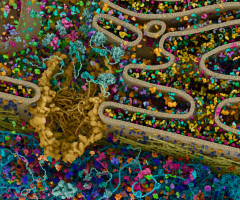
The discovery of metastasis-promoting protein receptors (CD36) in mouse cells has led to the launch of a new drug development initiative, reports a study published in Nature.
The Spanish researchers furthermore demonstrated that the CD36 metastatic process is enhanced by increased fat intakes.
Clinically, the presence of CD36 receptors on the membranes of tumour cells has been shown to correlate with poor prognosis in many different types of cancer cells.
CD36, found on the membranes of tumour cells, is known to be responsible for uptake of fatty acids into cells.
Working in mice with oral carcinoma samples isolated from human oral tumours, Salvador Aznar-Benitah and colleagues, from The Barcelona Institute of Science and Technology, found addition of CD36 protein receptors made tumours more metastatic.
The researchers replicated results with melanoma and luminal breast cancer cells.
“Although we have not yet tested this in all tumour types, we can state that CD36 is a general marker of metastatic cells – the first marker I know of that is generally specific to metastasis,” says Aznar-Benitah.
The next logical question for the investigators to ask was whether high fat diets might directly affect metastasis.
When the team randomised mice to high fat diets (containing 15% more fat than normal) or normal diets and inoculated them with oral cancers, mice on the high fat diets developed many more metastases.
“In mice inoculated with human tumour cells, there appears to be a direct link between fat intakes and an increase in metastatic potential through CD36,” said Aznar-Benitah.
Such finding, he adds, could explain associations between high fat diets and tumours, such as colon cancer.
The authors suggest that CD36 metastatic cells use lipid β oxidation to obtain the high amount of energy required for them to anchor and survive at sites distant from the primary tumour.
Finally, the authors showed when the CD36 receptor was blocked with antibodies (both in immune depressed mice and mice with intact immune systems) metastases were significantly reduced.
The administration of CD-36 blocking antibodies to mice with already established metastases resulted in metastases that were already present shrinking or in 20% of cases disappearing altogether.
The investigators are now working with MRC Technology in the UK to develop new antibody based therapeutics against CD36 for a range of cancers.
Source: Nature